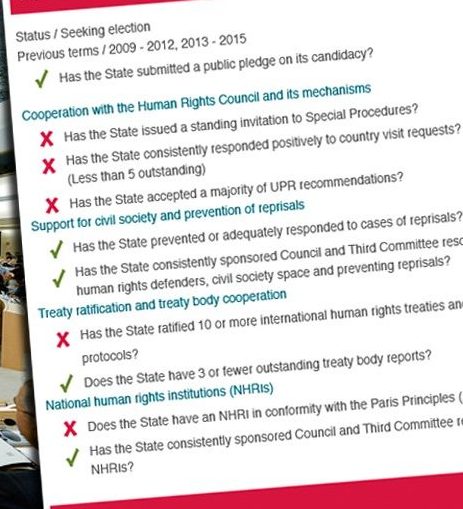
How do candidates for the Human Rights Council elections 2024-2026 rate?
ISHR has published ‘scorecards’ for States seeking election to the UN Human Rights Council for 2024-2026 to help inform voting States’ decisions in the upcoming election.
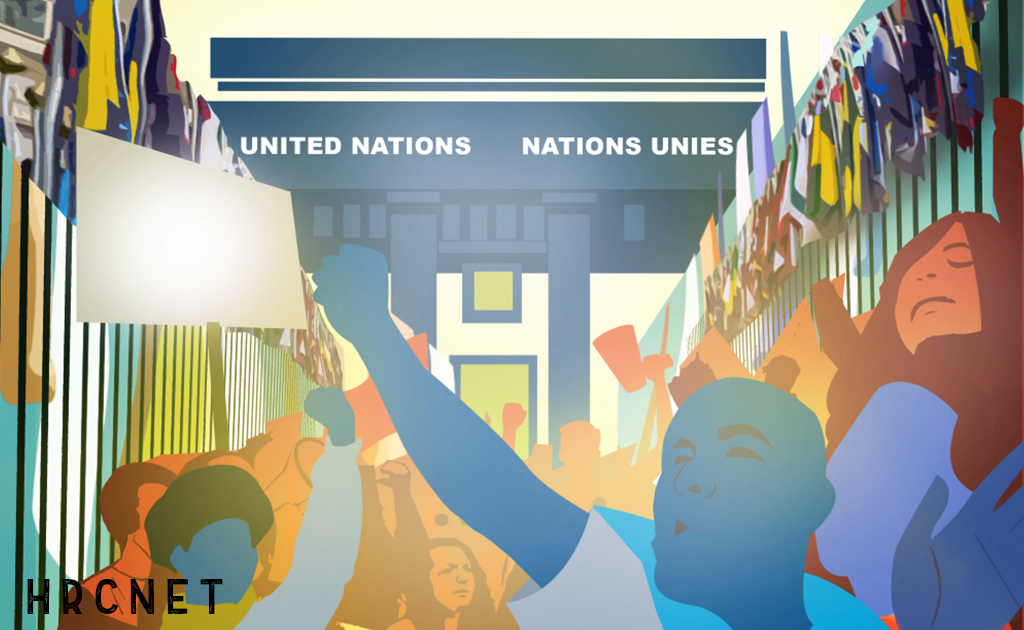
© Tercer Piso for HRCnet
17 countries are running for a seat at the Human Rights Council. All of them need to improve their human rights record. Join us to make sure the Council remains strong and principled!
Campaign Update: We did it! On 10 October the UN General Assembly elected 15 new members. Russia was resoundingly defeated while China received the lowest vote of candidates from Asia and Burundi the lowest vote from Africa. Thanks to all who joined the #HRCelections2023 campaign.
Learn more about this campaign win
For many victims and activists, the Human Rights Council is a critical arena to confront abuses of power and push for change in their countries. Its success depends on members and their commitment to promote and protect human rights at home and abroad. Every year in October, the 193 Member States of the UN elect new members to the Human Rights Council. In 2023, 17 candidates are running for 15 seats.
This year the candidate States are:
None of these candidates has a perfect human rights record: they all need to do better.
However, and according to the HRC membership criteria, three candidates stand out as manifestly unsuitable for membership on the Human Rights Council: China, Russia and Burundi.
We want all candidates to make voluntary pledges in which they commit to improve their human rights issues at home and abroad and their collaboration with the Council. We also want UN member States to make informed votes and vote only for State candidates that uphold the highest standards in the promotion and protection of human rights and fully cooperate with the UN. Russia, China and Burundi are not fit to sit at the Human Rights Council, each being responsible for the commission of atrocity crimes, a pattern of reprisals against those who cooperate with the UN, and the repression of civil society. We call on all UN States at the General Assembly to not vote for Russia, Burundi or China.
We increase the transparency of the election. ISHR has published scorecards that give a brief overview of the candidate’s record of cooperation and engagement with UN mechanisms. These scorecards help UN member States cast informed votes.
We create spaces where civil society and States can engage with candidates about their records and candidacies.On 6 September 2023 ISHR and Amnesty International organised an online pledging event where civil society could directly and constructively engage with candidate States by asking them questions. Candidates also elaborated on their human rights pledges and commitments made in the context of their candidacies. The whole list of questions asked during the event can be accessed here.
We engage with States through meetings, letters and calls and ask them to base their vote on the HRC membership criteria and vote only for State candidates that uphold the highest standards in the promotion and protection of human rights and fully cooperate with the UN.
China, Russia and Burundi stand out as manifestly unsuitable for membership on the HRC. Join us in calling on all UN States at the General Assembly to not vote for these three candidates. Click the image below to send a tweet to the UN member states who will be voting for the candidates. Once you click on it you will be able to edit the message. Don’t forget to mention specific States if you want to have more impact: you can pick your target(s) from this list!
The what, when and how of the 2023 elections!
The Human Rights Council is the main UN body in charge of human rights. At the Human Rights Council, States demonstrate to their peers that they are committed to protecting human rights. Together they discuss and tackle some of the worst human rights crises in the world and, where necessary, hold rights violators to account.
The Council consists of 47 states who represent the five “UN regions”: African States (13 seats), Asia-Pacific States (13 seats), Latin American and Caribbean States (8 seats), Western European and other States (7 seats) and Eastern European States (6 seats).
If you want to know more about the Human Rights Council please check out this video:
Roughly a third of the members change each year. Elections take place every October in New York.
The members are elected by the 193 states in the General Assembly. Candidates are expected to put forward voluntary pledges and commitments on what they will achieve as members. This should inform the decision of other States to support them in the elections.
Countries are not obliged to vote for all of the candidates. They can still not vote for a candidate country (even in a closed slate). They should vote with reflection, not in haste or in exchange for favours or political influence. They should only vote for the most committed candidates.
The countries elected will serve three-year terms beginning on 1 January 2024.
This year the candidate States are:
Candidates must be member states of the UN. Through membership of the Council, they commit themselves to “uphold the highest standards in the promotion and protection of human rights,” and to fully cooperate with the Council and its mechanisms.
None of the candidate countries has a perfect human rights record: all need to do better and can do so by working with civil society, including by developing time-bound pledges and commitments on what they propose to achieve. According to the HRC membership criteria, three candidates stand out as manifestly unsuitable for membership on the Human Rights Council: China, Russia and Burundi.
ISHR has published ‘scorecards’ for States seeking election to the UN Human Rights Council for 2024-2026 to help inform voting States’ decisions in the upcoming election. The scorecards offer a quick ‘at-a-glance’ objective comparison of the human rights record of each candidate through criteria such as focusing on their cooperation with human rights bodies such as the Council, their support for civil society, their engagement with UN Treaty Bodies and Special Procedures, among others. Check them out.
We want all candidates to commit to improve their human rights records and UN member states to vote only for the candidates that uphold the highest standards in the promotion and protection of human rights and fully cooperate with the UN. This year, Russia, China and Burundi are candidates that are clearly unfit to sit at the Human Rights Council.
We want elections to be more competitive.
This year, three of the five slates are competitive and have more candidates than there are seats available. States can still prevent Russia and Burundi from joining the Human Rights Council by voting for one of the other candidates seeking election within their respective slates.
Despite our joint call for competitive elections, two other regional group presented a ‘clean slate’ (one of which includes China) where the number of candidate States is equal to the number of available seats. All candidates in these slates will ultimately get elected.
This again demonstrate the importance of having competitive slates. ISHR continues to call on all regional groups going forward to ensure, as a matter of principle, competitive slates; to present more candidacies than the available seats; to encourage more States to present their candidacy; for all candidates to announce their candidacies with sufficient time for voting States and civil society to properly consider their candidacies; and in voting, for all States to commit to making human rights paramount in Council elections, rather than political considerations. All UN regional groups of member States should resist withdrawing candidacies to elections that are competitive.
In the present election, we can still make a difference by influencing the number of votes received by each candidate, which can provide an indication of their legitimacy as a Human Rights Council member.
ISHR considers that none of the candidates has a perfect human rights record: they all need to do better.
However, and according to the HRC membership criteria, three candidates stand out as manifestly unsuitable for membership on the Human Rights Council: China, Russia and Burundi.
Russia, China and Burundi are not fit to sit at the Human Rights Council. UN member States are not obliged to vote for all candidates, they can still not vote for a candidate country (even in a closed slate). They must only vote for candidates that uphold the highest standards in the promotion and protection of human rights and fully cooperate with the UN.
Check out the video created by our HRCNet coalition which explains the importance of the election and how civil society can participate:
Want to know more on the Human Rights Council elections? Check out our additional resources!

ISHR has published ‘scorecards’ for States seeking election to the UN Human Rights Council for 2024-2026 to help inform voting States’ decisions in the upcoming election.
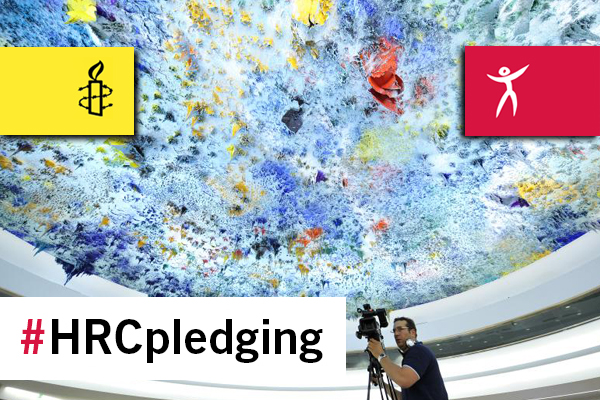
In advance of the Human Rights Council elections that will take place this autumn for the membership term 2024-2026, Amnesty International and the International Service for Human Rights will hold an online pledging event for candidate States on 6 September 2023.
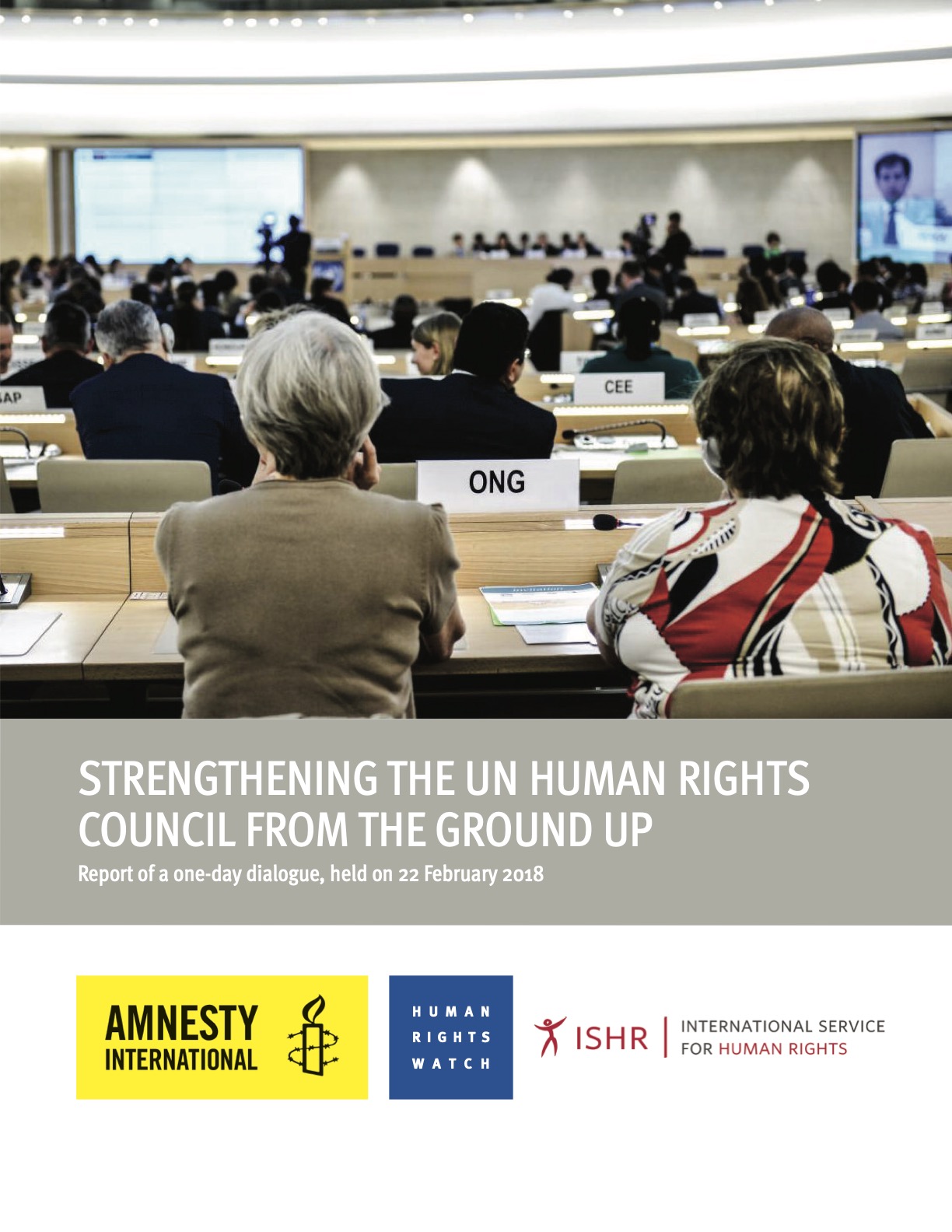
In this report, Amnesty International, the International Service for Human Rights (ISHR) and Human Rights Watch, together with HRC-net, highlight measures to strengthen the credibility and legitimacy of the UN Human Rights Council’s membership.
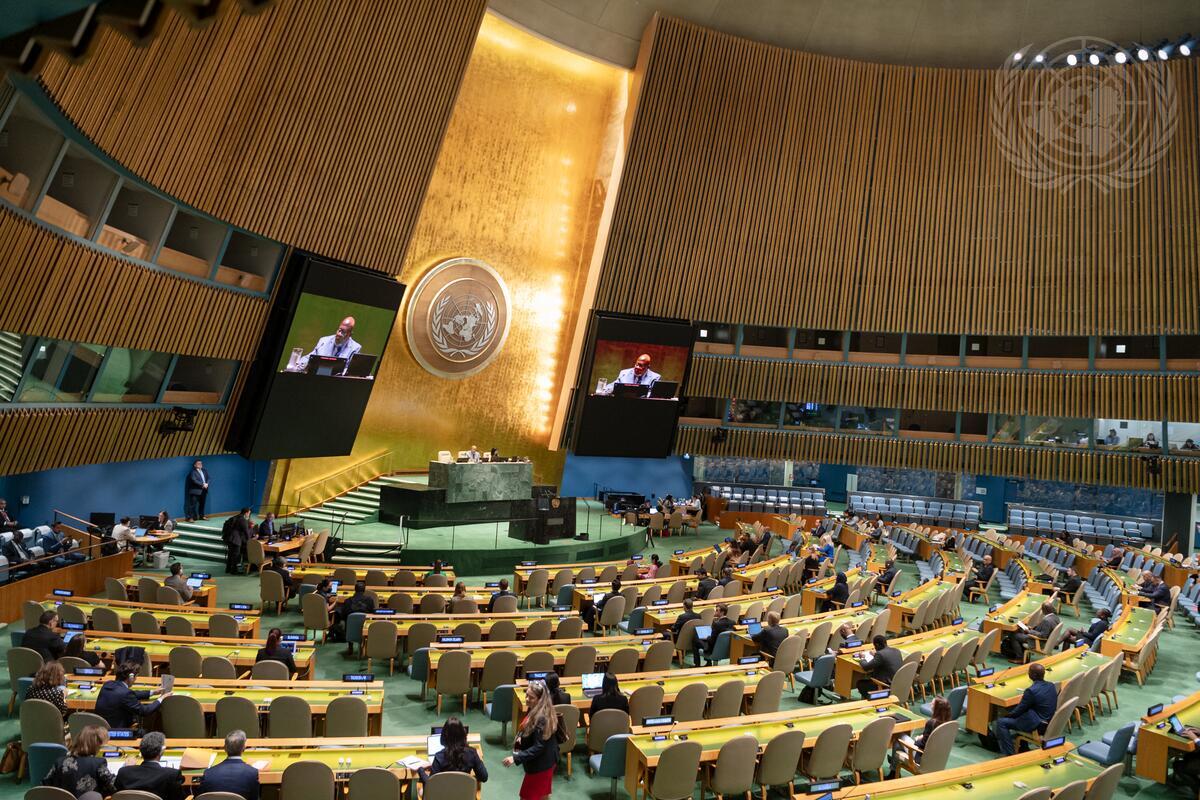
The UN General Assembly voted in 15 new members of the Human Rights Council today. Though they elected China and Burundi in closed, uncompetitive races, States voted against Russia’s return despite Moscow’s sustained pressure.
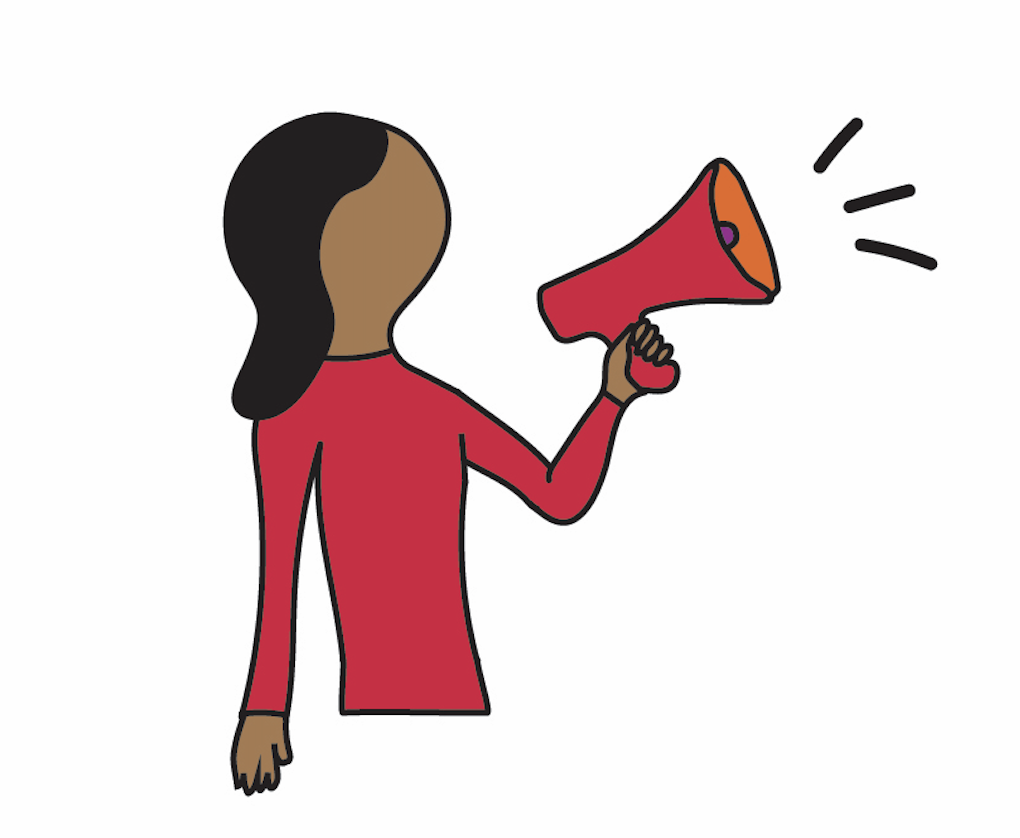
We would be happy to jointly explore further advocacy/campaign opportunities. If you are interested in further opportunities to engage, please drop us an email!
Send an email